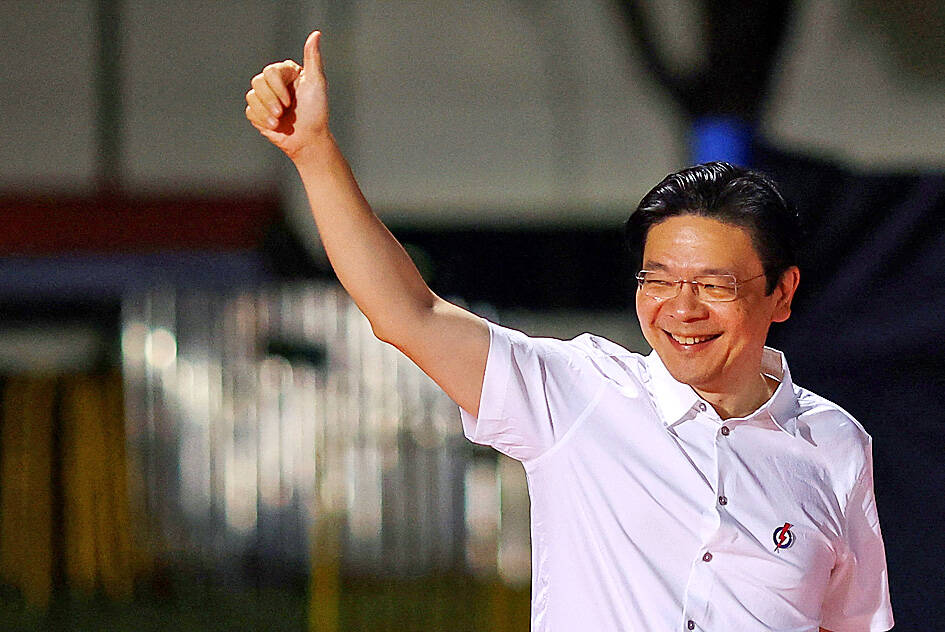Singaporean Prime Minister Lawrence Wong (黃循財) said the convincing re-election of his People’s Action Party (PAP) would help the city-state face turbulent times, as analysts said the weekend poll also showed one party emerging as the main opposition group.
The PAP’s 14th successive election victory was never in question. Instead, the focus was on the mandate voters would give Wong in his first electoral test since assuming the top job a year ago.
The PAP, which has ruled since before Singapore’s 1965 independence, won 87 of the 97 parliamentary seats up for grabs in Saturday’s vote, the election commission said.

Photo: Reuters
Wong said the PAP won 65 percent of the vote, improving on the 61 percent achieved in the 2020 contest.
“The results will put Singapore in a better position to face this turbulent world,” Wong said in the early hours of yesterday.
Unspoken was the cause of that turbulence, with US President Donald Trump’s upending of the global order and tariff regime posing a threat to Singapore, a small, open and trade-driven nation.
Australia’s Labor Party on Saturday won an increased majority in an election and Canada’s Liberal Party last week retained power with the Trump factor also cited as a key factor.
“Hence, this suggests that there is indeed a strong element of a flight to safety among voters,” said Gillian Koh, senior research fellow in governance and economy at the Institute of Policy Studies in Singapore, adding that there were also local factors at play.
The 10 seats that the PAP did not win on Saturday were all won by the Workers’ Party.
“It was a very difficult fight for the Workers’ Party, as you know, any opposition party in Singapore, to make inroads into our political system, the challenges are real,” party leader Pritam Singh told reporters yesterday.
Analysts said the Workers’ Party had solidified its position as the main challenger to the PAP’s stranglehold on power.
“It is a hard, thankless slog, but they are attracting really high-quality candidates, running a tight outfit, and using these elections to give new people valuable electioneering experience,” Flinders University College of Business, Government and Law associate professor Michael Barr said.

WAITING GAME: The US has so far only offered a ‘best rate tariff,’ which officials assume is about 15 percent, the same as Japan, a person familiar with the matter said Taiwan and the US have completed “technical consultations” regarding tariffs and a finalized rate is expected to be released soon, Executive Yuan spokeswoman Michelle Lee (李慧芝) told a news conference yesterday, as a 90-day pause on US President Donald Trump’s “reciprocal” tariffs is set to expire today. The two countries have reached a “certain degree of consensus” on issues such as tariffs, nontariff trade barriers, trade facilitation, supply chain resilience and economic security, Lee said. They also discussed opportunities for cooperation, investment and procurement, she said. A joint statement is still being negotiated and would be released once the US government has made

Authorities have detained three former Taiwan Semiconductor Manufacturing Co (TMSC, 台積電) employees on suspicion of compromising classified technology used in making 2-nanometer chips, the Taiwan High Prosecutors’ Office said yesterday. Prosecutors are holding a former TSMC engineer surnamed Chen (陳) and two recently sacked TSMC engineers, including one person surnamed Wu (吳) in detention with restricted communication, following an investigation launched on July 25, a statement said. The announcement came a day after Nikkei Asia reported on the technology theft in an exclusive story, saying TSMC had fired two workers for contravening data rules on advanced chipmaking technology. Two-nanometer wafers are the most

NEW GEAR: On top of the new Tien Kung IV air defense missiles, the military is expected to place orders for a new combat vehicle next year for delivery in 2028 Mass production of Tien Kung IV (Sky Bow IV) missiles is expected to start next year, with plans to order 122 pods, the Ministry of National Defense’s (MND) latest list of regulated military material showed. The document said that the armed forces would obtain 46 pods of the air defense missiles next year and 76 pods the year after that. The Tien Kung IV is designed to intercept cruise missiles and ballistic missiles to an altitude of 70km, compared with the 60km maximum altitude achieved by the Missile Segment Enhancement variant of PAC-3 systems. A defense source said yesterday that the number of

Taiwanese exports to the US are to be subject to a 20 percent tariff starting on Thursday next week, according to an executive order signed by US President Donald Trump yesterday. The 20 percent levy was the same as the tariffs imposed on Vietnam, Sri Lanka and Bangladesh by Trump. It was higher than the tariffs imposed on Japan, South Korea and the EU (15 percent), as well as those on the Philippines (19 percent). A Taiwan official with knowledge of the matter said it is a "phased" tariff rate, and negotiations would continue. "Once negotiations conclude, Taiwan will obtain a better